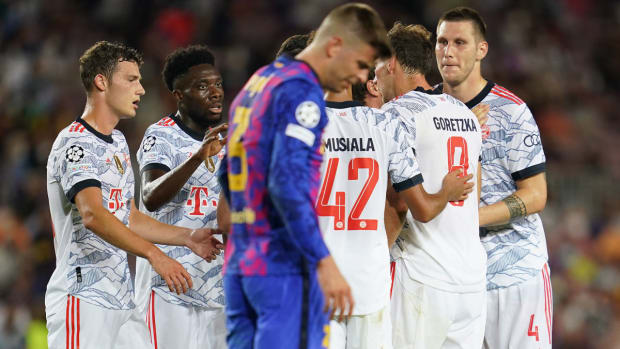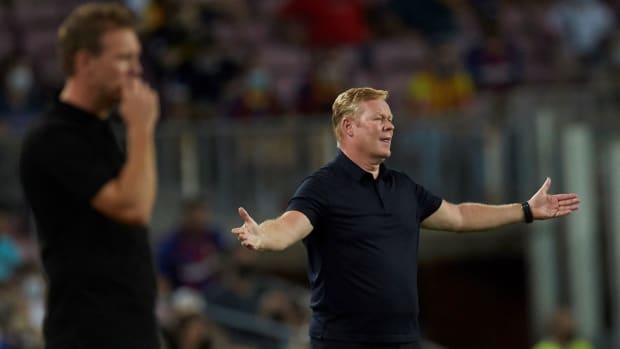A 3–0 home defeat to Bayern Munich in the Champions League was just further evidence of the depths to which the once-great club has fallen.
It says much for the state of the modern Barcelona that the question as it began its 2021-22 Champions League campaign was less whether it could win the title rather than how early it could go out without it being an embarrassment. Defeat to Bayern Munich in their group opener on Tuesday was largely anticipated, and so low are expectations these days that the fact the scoreline was "only" 3–0, the fact Barça was not utterly humiliated, will be seen by some as a positive.
But the gulf between the sides was obvious. Bayern was at nowhere near its best, playing at half pace and with surprisingly little penetration. But it was utterly in control and after a couple of early flurries, Barcelona simply didn’t threaten. The hosts didn't even must a shot on goal.
Barcelona has been the most obvious victim of football’s new financial reality. Suddenly it is not too big to fail, the pandemic exposing the hopeless mismanagement that left it $1.4 billion in debt. The obvious consequence of that, from a playing point of view, was the departure of Lionel Messi to Paris Saint-Germain this summer, but that really was just the latest manifestation of much greater problems with recruitment that have left the club still weirdly reliant on Gerard Piqué, Jordi Alba and Sergio Busquets (and for more than just their willingness to take pay cuts). Six of the starting XI on Tuesday played in the 8–2 quarterfinal defeat to Bayern the season before last, the match that marked a symbolic beginning of the end of an era, even if the roots stemmed from far before.

PRESSINPHOTO/Sipa USA
Of those who are no longer at the club it is of course Messi who stands out. There was a sense that he could transform any game, that no matter how poorly Barcelona was playing he could produce something of brilliance. His lack of pressing may have exposed the midfield—leading to those heavy defeats in recent years, not only to Bayern, but also to PSG, Liverpool, Roma and Juventus—but while he was on the pitch there was hope. There was little of that on Tuesday, in the club's first Champions League campaign without Messi since 2002-2003.
The underlying crisis has been compounded by more familiar concerns. Any side would be rattled by the injury problems currently afflicting Barcelona, which was without Sergio Agüero, Ansu Fati, Martin Braithwaite and Ousmane Dembélé; Jordi Alba, forced off in the 74th minute, may have joined them. This was an extraordinary game for Luuk De Jong to make his Barcelona debut—and extraordinary, too, that Barcelona now has in its squad forwards who failed to make the grade at Newcastle and Middlesbrough.
And then there’s the classic Barcelona trope of a coach and the president falling out. Ronald Koeman’s contract expires next summer, and it feels as though already he has given up hope of being granted an extension, even though Joan Laporta, having failed to find a replacement this summer, promised a new deal if Koeman fulfills certain criteria.
“My relationship with Laporta has improved but something happened last week that I think is not right,” Koeman said recently. “He was suggesting that the coach does not have all the power. He spoke too much and was not wise on two occasions. That can be done in private. I like when a president is engaged and asks questions, only that should not happen in the press. That was the problem. I'm open to staying, I'm just having a good time. Thanks to me, this club has a future.”

EFE/Alejandro Garcia/Sipa USA
That’s a typical Koeman response, as he is not somebody naturally given to hiding his light under a bushel, but it is not without some truth. He has promoted a lot of youth players and he can realistically argue that he has done a reasonable job in almost impossible circumstances. But that future he speaks of is not imminent; he admitted it will be at least two years before Barcelona can begin to compete with the best.
"We played with four, five kids," Piqué said after the match, with a sense of realism. "They compete amazing and really I think we have to invest in them. They are the future of the club. It's true that it's not the best time since I've been here. We suffered a bit. But I think that we will grow up. We will be better. And I'm sure that at the end of the year we will compete for the titles."
The decision for Barcelona to start with a back three, while forced upon him to an extent, did help frustrate Bayern and worked to a degree. Bayern was not fluent and did not have the verve that characterizes the club at its best. The extra man at the back did help plug gaps. Even the opening goal, scored after 34 minutes, was a deflected strike from Thomas Müller. But Bayern had had the ball for almost two minutes before the shot, which gives some idea of how changed Barcelona’s ambitions are. Perhaps the impact was to grind Barcelona down, but the fact nobody closed Müller down and that Eric García turned his body, so the ball was diverted in off his lower back, had nothing to do with structures; those were basic individual errors.
Robert Lewandowski added two goals in the second half, both on follow-up attempts after Bayern shots hit the post, to complete a comfortable 3–0 win. This was a relative stroll, and Barcelona remains a mess.
More Soccer Coverage:

0 Comments:
Post a Comment